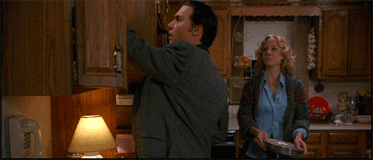Donnie Brasco (Mike Newell) 1997
 Donnie Brasco was an unlikely feature for director
Mike Newell to produce, coming after such successes as Enchanted April
and Four Weddings and a Funeral, but, against all odds, it’s one of the
most moving and insightful gangster films ever made. Surely a lot of the credit
has to go to Paul Attanasio, who imbues the film with the same moral ambiguities
and fierce intelligence that graced his script for Quiz Show. The cast
helps a good deal too. Newell coaxes stunning turns from Al Pacino, Johnny Depp,
and Anne Heche, all of them at least as good as they’ve ever been elsewhere.
Ultimately, though, it seems that Newell’s sure hand is to blame for the
solidness of the film. Rarely does the film overstate itself. The period detail
is rich and specific without ever becoming gaudy or overdone. The somber tone of
the film is enriched by the decidedly cloudy look that was chosen. Even Miami
looks run down here, sapping a lot of the sense of glamour that other gangster
films have indulged.
Donnie Brasco was an unlikely feature for director
Mike Newell to produce, coming after such successes as Enchanted April
and Four Weddings and a Funeral, but, against all odds, it’s one of the
most moving and insightful gangster films ever made. Surely a lot of the credit
has to go to Paul Attanasio, who imbues the film with the same moral ambiguities
and fierce intelligence that graced his script for Quiz Show. The cast
helps a good deal too. Newell coaxes stunning turns from Al Pacino, Johnny Depp,
and Anne Heche, all of them at least as good as they’ve ever been elsewhere.
Ultimately, though, it seems that Newell’s sure hand is to blame for the
solidness of the film. Rarely does the film overstate itself. The period detail
is rich and specific without ever becoming gaudy or overdone. The somber tone of
the film is enriched by the decidedly cloudy look that was chosen. Even Miami
looks run down here, sapping a lot of the sense of glamour that other gangster
films have indulged.
 Frankly, I prefer Donnie Brasco on many levels to
the inflated operatic tragedy that is The Godfather. Since Donnie Brasco
is an undercover agent who flirts with going native, the audience is put
repeatedly in a place where they can sympathize with the mobsters, but never
burdened as strong a feeling that they are truly honorable just because they
exhibit some honorable characteristics. A minor false note emerges in the
caricature that is Donnie’s commanding officer, and his presence seems to tip
the scales a bit unfairly toward resenting the authorities, but the authentic
presence of Donnie’s long-suffering wife grounds many of those feelings. When
the film finally shows the result of violence on screen, it’s notably and
responsibly because of Donnie’s complicity, and the film allows us to see the
complexity inherent in a character who has to do a lot of bad things to do
right.
Frankly, I prefer Donnie Brasco on many levels to
the inflated operatic tragedy that is The Godfather. Since Donnie Brasco
is an undercover agent who flirts with going native, the audience is put
repeatedly in a place where they can sympathize with the mobsters, but never
burdened as strong a feeling that they are truly honorable just because they
exhibit some honorable characteristics. A minor false note emerges in the
caricature that is Donnie’s commanding officer, and his presence seems to tip
the scales a bit unfairly toward resenting the authorities, but the authentic
presence of Donnie’s long-suffering wife grounds many of those feelings. When
the film finally shows the result of violence on screen, it’s notably and
responsibly because of Donnie’s complicity, and the film allows us to see the
complexity inherent in a character who has to do a lot of bad things to do
right.
 We rarely get a romanticized perception of mafia life here,
but that doesn’t keep us from sympathizing with Pacino’s character. His
performance as goombah to Donnie is exceptionally rich, and his complex
combination of pride and shame about who he is makes him far more human than his
characterizations might initially allow us to think. He’s a human first and a
mobster second, which is about the highest praise you can give to a performance
in a movie of this sort. Emotions
are exceptionally charged here, and the cloying score makes sure we know that,
but somehow the dam never bursts. Especially during the understated ending,
Newell keeps the film tightly reigned in and the reality and scope of Donnie’s
sacrifices never seem far away.
We rarely get a romanticized perception of mafia life here,
but that doesn’t keep us from sympathizing with Pacino’s character. His
performance as goombah to Donnie is exceptionally rich, and his complex
combination of pride and shame about who he is makes him far more human than his
characterizations might initially allow us to think. He’s a human first and a
mobster second, which is about the highest praise you can give to a performance
in a movie of this sort. Emotions
are exceptionally charged here, and the cloying score makes sure we know that,
but somehow the dam never bursts. Especially during the understated ending,
Newell keeps the film tightly reigned in and the reality and scope of Donnie’s
sacrifices never seem far away.
****
01-25-02
Jeremy Heilman